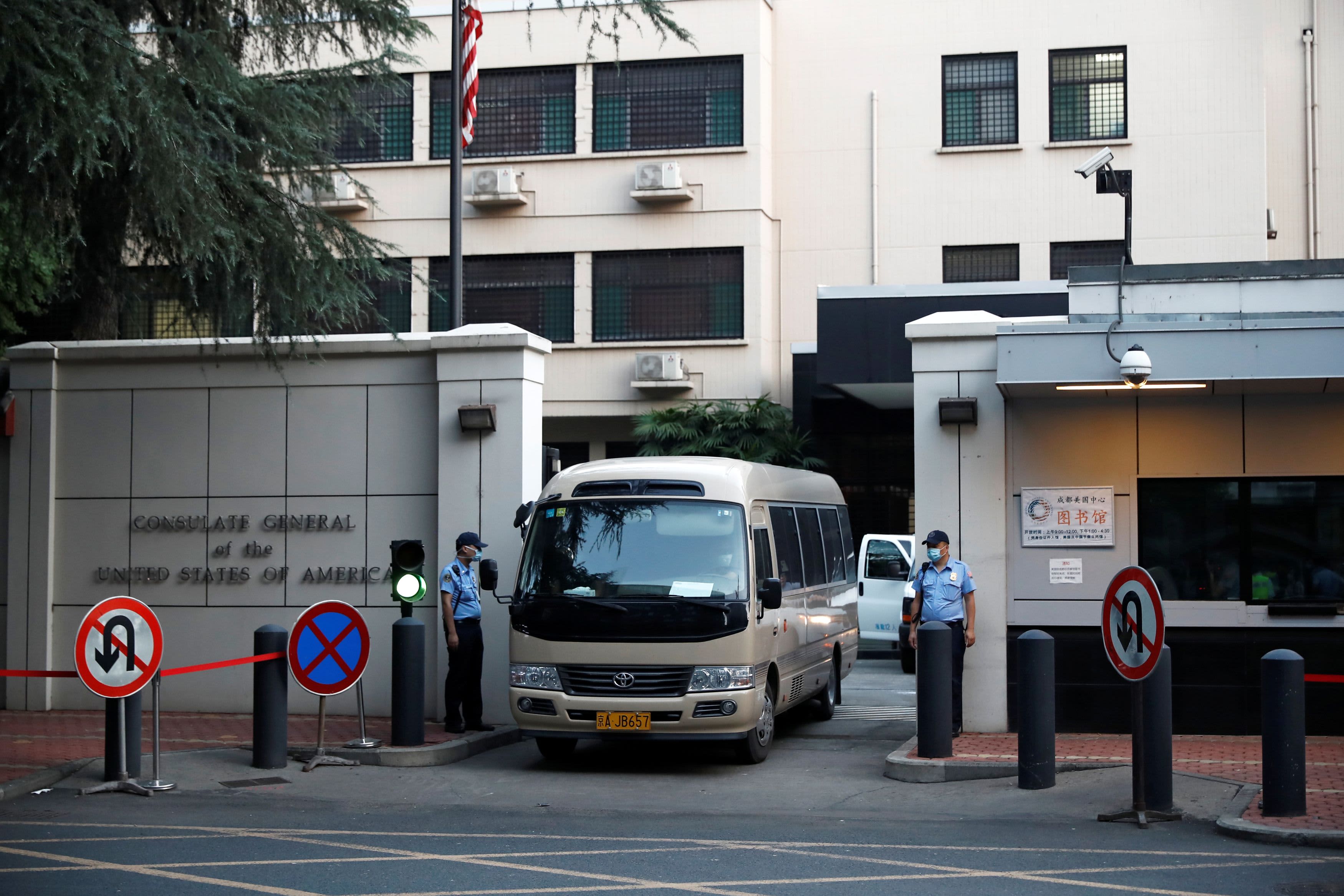
WASHINGTON — The Trump administration closed its consulate in the southwestern Chinese city of Chengdu on Monday, reducing America’s diplomatic footprint in the world’s second-largest economy as relations between Washington and Beijing hit a boiling point.
The U.S. Consulate in Chengdu opened 35 years ago and up until Monday employed 200 people, of which 50 were U.S. diplomats and 150 were local hires, according to the consulate website.
U.S. Marines lowered the American flag that once flew over the consulate and a covering was placed over the plaque marking its entrance as the U.S. diplomatic staff left its mission in compliance with a Chinese order. The U.S. now has five remaining consulates in Shanghai, Wuhan, Guangzhou, Shenyang and Hong Kong-Macau as well as its embassy in Beijing.
Relations between the world’s two largest economies have plunged to their worst point in years over a variety of issues, ranging from trade and cybersecurity to the Covid-19 pandemic, to China’s territorial claims in the South China Sea and its growing clampdown on Hong Kong’s autonomy.
On Friday morning, China’s Ministry of Foreign Affairs directed the U.S. Embassy in Beijing to cease operations at its consulate in Chengdu, a city in southwest China’s Sichuan province.
“The consulate has stood at the center of our relations with the people in Western China, including Tibet, for 35 years. We are disappointed by the Chinese Communist Party’s decision and will strive to continue our outreach to the people in this important region through our other posts in China,” a Department of State spokesperson said.
China’s Foreign Ministry spokesman, Wang Wenbin, said some U.S. Chengdu consulate personnel were “conducting activities not in line with their identities” and had harmed China’s security interests, but would not elaborate.
“The current situation in China-U.S. relations is not what China desires to see and the U.S. is responsible for all this. We once again urge the U.S. to immediately retract its wrong decision and create necessary conditions for bringing the bilateral relationship back on track,” he added.
Earlier in the week, the Trump administration ordered China to close its consulate in Houston. Officials said the decision to shut down the Chinese Consulate was made to secure U.S. intellectual property and curb Chinese espionage.
A senior State Department official, who spoke on condition of anonymity, described the U.S. decision to close the Chinese consulate in Houston as “serious” and reflective of “long-standing concerns.” The person also said that the Trump administration would be prepared to deal with second- and third-order effects in the wake of this decision but would not elaborate.
“On their decision to close Chengdu, you’re going to have to ask them, the MFA, about how they picked that,” the official said. The same official said the Department of State would continue to send U.S. diplomats to China, saying, “We still have a job to do out there.”
Read more: China alienates its Washington allies as its relationship with the U.S. worsens, analysts say
In another sign of increasingly frayed ties between the U.S. and China, the Department of Justice charged four Chinese nationals earlier this month with visa fraud in California and Indiana after they allegedly lied about their Chinese military service.
The arrests were described as “a microcosm of a broader network of individuals in more than 25 cities,” a senior Justice Department official said Friday.
Last week, Secretary of State Mike Pompeo slammed the Chinese government in a sweeping address, saying the United States will no longer tolerate Beijing’s ambitions to usurp global order.
“We opened our arms to Chinese citizens, only to see the CCP exploit our free and open society. It sent propagandists into our press conferences, our research centers, our high school and college campuses,” Pompeo told an audience at the Richard Nixon Presidential Library in Yorba Linda, California.
The nation’s top diplomat added that the Chinese government had also “ripped off our prized intellectual property” and “sucked supply chains away from America.”
His remarks capped a string of searing speeches by Trump administration officials, including Attorney General Bill Barr and FBI Director Chris Wray, on malign Chinese actions.


